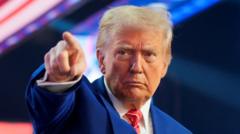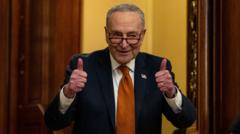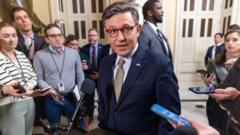Trump's stance raises questions about the impact of his foreign policy decisions on Syria, especially in light of the changing dynamics on the ground following Assad's regime’s collapse.
**Trump Declares Syria Conflict Not US Responsibility: Implications Ahead**

**Trump Declares Syria Conflict Not US Responsibility: Implications Ahead**
In a recent statement, Donald Trump emphasized the need for the US to disengage from Syria's turmoil, igniting discussions about the future of American involvement in the region.
In Paris, while Donald Trump participated in a celebration of the restored Notre Dame Cathedral, upheaval unfolded in Syria. Islamist fighters were reportedly advancing on Damascus as Trump articulated his stance toward the conflict on his Truth Social network, asserting, "Syria is a mess, but is not our friend." He reiterated a non-interventionist position by stating, "THE UNITED STATES SHOULD HAVE NOTHING TO DO WITH IT. THIS IS NOT OUR FIGHT. LET IT PLAY OUT." This underscores a clear message from the president-elect that Americans should avoid new entanglements in foreign wars, despite the geopolitical complexities emerging from the Syrian civil war’s latest developments.
As Syria's political landscape shifts with the downfall of President Bashar al-Assad, concerns arise regarding America's role in this volatile region. The existing Biden administration has engaged in intense diplomatic discussions following these swift changes in power, particularly with the rise of Hayat Tahrir al-Sham (HTS)—a group the U.S. classifies as a terrorist organization. Secretary of State Antony Blinken has been pursuing support from various Arab and Muslim nations to establish criteria for recognizing a potential Syrian government, emphasizing the need for transparency and security against terrorism.
Despite Trump's clear mantra for the U.S. to withdraw from Middle Eastern conflicts, he faces pressure from advisers who hold a more interventionist perspective, especially concerning counterterrorism efforts. Current U.S. troops stationed in Syria focus on containing the Islamic State group and providing support to the Syrian Democratic Forces (SDF), comprising Kurdish and Arab fighters. However, Trump's historical reluctance toward Syria, marked by remarks labeling it as a land of "sand and death," complicates the approach he might take with his incoming cabinet.
History shows that Trump's initial isolationist strategies were sometimes overshadowed by urgent matters demanding action. Though he has reiterated that Syria is not a direct U.S. interest, experts argue that the realities on the ground may compel a more engaged approach from him. While analyzing the implications of one of his nominated officials, Wa’el Alzayat noted that Trump's administration will feature influential figures, hinting at a potential shift from his earlier stance.
Moreover, debates regarding U.S. troop levels and their interactions with various Syrian factions add another layer of complexity, particularly in the wake of substantial incidents like drone strikes on American interests by Iranian-allied militias. The incoming administration will have to navigate these tumultuous waters while maintaining strategic U.S. interests.
Currently, while both Trump and Biden share common goals regarding the desired governance in Syria, differing methodologies could lead to divergent outcomes. Specifically, the Biden administration has expressed empathy towards Kurdish forces in Syria, something Trump may not prioritize as highly, highlighting the difference in emotional and strategic investment in the region. Trump, keen to establish foreign relations with nations like Saudi Arabia while countering Iranian influence, may endeavor to manage troop withdrawal alongside new agreements with neighboring countries like Turkey—in turn intensifying concerns about the implications for Kurdish autonomy.
As Trump prepares to assume office, his declarations about Syria not being an American fight encapsulate his broader isolationist philosophy, yet it remains to be seen how forthcoming realities on the ground will shape his administration's actual policy decisions and interventions in this historically complex region.
As Syria's political landscape shifts with the downfall of President Bashar al-Assad, concerns arise regarding America's role in this volatile region. The existing Biden administration has engaged in intense diplomatic discussions following these swift changes in power, particularly with the rise of Hayat Tahrir al-Sham (HTS)—a group the U.S. classifies as a terrorist organization. Secretary of State Antony Blinken has been pursuing support from various Arab and Muslim nations to establish criteria for recognizing a potential Syrian government, emphasizing the need for transparency and security against terrorism.
Despite Trump's clear mantra for the U.S. to withdraw from Middle Eastern conflicts, he faces pressure from advisers who hold a more interventionist perspective, especially concerning counterterrorism efforts. Current U.S. troops stationed in Syria focus on containing the Islamic State group and providing support to the Syrian Democratic Forces (SDF), comprising Kurdish and Arab fighters. However, Trump's historical reluctance toward Syria, marked by remarks labeling it as a land of "sand and death," complicates the approach he might take with his incoming cabinet.
History shows that Trump's initial isolationist strategies were sometimes overshadowed by urgent matters demanding action. Though he has reiterated that Syria is not a direct U.S. interest, experts argue that the realities on the ground may compel a more engaged approach from him. While analyzing the implications of one of his nominated officials, Wa’el Alzayat noted that Trump's administration will feature influential figures, hinting at a potential shift from his earlier stance.
Moreover, debates regarding U.S. troop levels and their interactions with various Syrian factions add another layer of complexity, particularly in the wake of substantial incidents like drone strikes on American interests by Iranian-allied militias. The incoming administration will have to navigate these tumultuous waters while maintaining strategic U.S. interests.
Currently, while both Trump and Biden share common goals regarding the desired governance in Syria, differing methodologies could lead to divergent outcomes. Specifically, the Biden administration has expressed empathy towards Kurdish forces in Syria, something Trump may not prioritize as highly, highlighting the difference in emotional and strategic investment in the region. Trump, keen to establish foreign relations with nations like Saudi Arabia while countering Iranian influence, may endeavor to manage troop withdrawal alongside new agreements with neighboring countries like Turkey—in turn intensifying concerns about the implications for Kurdish autonomy.
As Trump prepares to assume office, his declarations about Syria not being an American fight encapsulate his broader isolationist philosophy, yet it remains to be seen how forthcoming realities on the ground will shape his administration's actual policy decisions and interventions in this historically complex region.





















